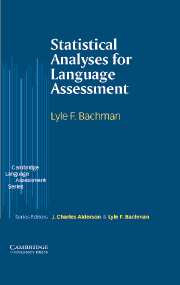Book contents
- Frontmatter
- Contents
- Series Editor's Preface
- Acknowledgements
- Abbreviations
- Part I Basic concepts and statistics
- Part II Statistics for test analysis and improvement
- Part III Statistics for test use
- 7 Stating hypotheses and making statistical inferences
- 8 Tests of statistical significance
- 9 Investigating validity
- 10 Reporting and interpreting test scores
- Bibliography
- Appendix: Statistical tables
- Index
9 - Investigating validity
Published online by Cambridge University Press: 05 May 2010
- Frontmatter
- Contents
- Series Editor's Preface
- Acknowledgements
- Abbreviations
- Part I Basic concepts and statistics
- Part II Statistics for test analysis and improvement
- Part III Statistics for test use
- 7 Stating hypotheses and making statistical inferences
- 8 Tests of statistical significance
- 9 Investigating validity
- 10 Reporting and interpreting test scores
- Bibliography
- Appendix: Statistical tables
- Index
Summary
Introduction
The reason we give a language test and obtain a test score is so that we can interpret that score as an indicator of what a test taker knows or can do. In addition, we generally intend to use that interpretation as a basis for making a decision of some kind. Thus, when we use a test score, we are making an implicit link between performance on the test, on the one hand, and a domain of language knowledge the test taker has or something the test taker can do with language in some language use domain beyond the test itself, on the other. To put it another way, when we use test scores, we are essentially reasoning from evidence, using the test score as the evidence for the inferences or interpretations and decisions we want to make (Mislevy, 1996).
However, we cannot simply give a test and use it to make inferences and decisions without providing adequate justification for this. If we want to use test scores for these purposes, we must provide a rationale and supporting evidence that justifies this use. That is, we need to demonstrate, with logical argumentation and empirical evidence, that the intended interpretations and uses are valid.
While it may be obvious to test developers that we must justify and be accountable for the ways in which we use test scores, the procedures for providing this justification are often clouded in theoretical formulations or statistical analyses.
- Type
- Chapter
- Information
- Statistical Analyses for Language Assessment Book , pp. 257 - 293Publisher: Cambridge University PressPrint publication year: 2004



